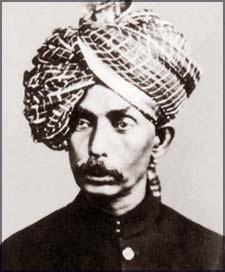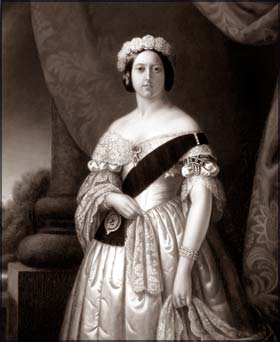An English Queen and her Indian love
Random Thoughts
S. Pathiravitana
Had Queen Victoria developed the same affections for Ceylon as she
had done for India perhaps the course of history may have taken a
different turn for us Ceylonese?. Historians don’t seem to think that
her love for India began after she met Abdul Karim, her groom, whom she
promoted later on to be her teacher.
|

Abdul Karim |
At the same time she instructed her Ministers to call him Munshi, the
Indian term for teacher, for teaching her to speak Hindustani. She
didn’t quite master that language though, but she continued to relish
the curries Karim prepared for her now and again.
Her Ministers were getting rather worried or may be even jealous of
the special privileges that the former groom was enjoying. Even before
getting to know Abdul Kareem, the Queen was strangely drawn towards
India.
Greatest wish
The Mutiny had taken place not so long ago; and it was during the
reconciliation period that began soon after with the closing down of the
East India Company that the Queen’s interest got turned towards India.
She informed the Minister in charge during the reconciliation period
that the “Indian people should know that there is no hatred towards a
brown skin, none; but the greatest wish on their Queen’s part was to see
them happy, contented and flourishing.”
When the Ministers drew up a formal statement explaining to the
Indian people the circumstances that had made the government change its
attitude, she was taken aback with the tone of the proclamation and
“insisted that certain parts of it must be altered, and one passage in
the final document was clearly and importantly all her own work.” And
this was that passage:
“Firmly relying ourselves on the truth of Christianity and
acknowledging with gratitude the solace of religion, we disclaim alike
the right and the desire to impose on any of our subjects...
We do strictly charge and enjoin all those who may be in authority
under us that they may all abstain from interference with the religious
belief or worship of any of our subjects on pain of our highest
displeasure.”
Now, I seem to understand from where the current Prince of Wales,
Prince Charles, has inherited his tolerance of other religions and
particularly at this moment of time his attempt to build bridges between
Islam and the West.
But let us return to the role his strong-minded ancestor Victoria
played a little over a century ago. She did enjoy being Queen. She
didn’t baulk at the idea when her Prime Minister, Disraeli, proposed a
decade or two later that she be called Empress of India and be
officially known as Victoria Regina Imperatrix.
Once she pulled up one of her Prime Ministers for identifying Indians
as ‘black men.’ And knowing what a bureaucracy can turn out to be, “The
future Viceroy,” she warned, “must really shake himself more and more
free from his red-tapist, narrow minded Council and entourage.
Empire
He must... not be guided by the snobbish and vulgar overbearings and
offensive behaviour of many of our Civil and Political Agents...” It
seems a pity that she overlooked some of her subjects elsewhere in her
empire compared to the special interest she took over India.
Had she taken a look across the Indian ocean and down below to Ceylon
she would have found how places of Buddhist worship had been robbed of
their lands and the special interest that the British promised to take
over the position of Buddhism in the Island was being ignored by the
self-same ‘red-tapism’ and the ‘overbearing’ that she condemned in her
officials in India.
|

Queen Victoria |
Was Abdul Kareem and his cultural background the reason that kept her
from taking an equal interest in the condition of her other subjects
elsewhere in her empire? Abdul Kareem came into her life after 1887,
three decades after the Indian Mutiny. The tussles she had with her
officials took place before that date.
1887 was the year he was appointed a groom after her Scottish groom
died four years earlier. His elevation to that post from being a servant
in the royal household incurred the charge from its senior members that
he was an “upstart with a tendency to lie for his self advancement.”
Earlier he had been a junior clerk working in the Agra jail and was 24
at the time he entered Her Majesty’s service.
He let it be known that his father was a Surgeon-General in the
Indian army when he was not. But by the time it was discovered that he
was lying it was too late. He had become a firm favourite with the
Queen.
It has been said that when the court officials brought this
falsification charge to the notice of the Queen, she turned on them and
accused them of being a prejudiced lot. She had also told them that she
knew of two Archbishops one who was a butcher’s son and the other a
grocer’s. So much for Britain’s class- consciousness!
Abdul Kareem continued to enjoy the special patronage of the Queen.
On her part she noted in her diary after one of her lessons in
Hindustani that her teacher, Munshi, the Indian name by which he was
known, “was a very strict Master,...a perfect Gentleman” She also got a
portrait of her Master done in oils.
He was also a constant companion on her journeys to Scotland for
Braemar Highland Gatherings or to the theatre. So close was Abdul Kareem
to the Queen that her ministers were soon worrying about state policy
being revealed to unauthorised persons. Even the Hindus among her Indian
subjects were beginning to fear, it was alleged, of a Muslim being so
close to the British throne.
Confidential
She dismissed such warnings as further examples of the ‘racial and
social prejudices of her ministers’ until one day when the Secretary of
State for India, Lord George Hamilton told the Queen that he may have to
stop sending confidential material if she continued to share that
information with the Munshi.
She had to comply. But what she gave with one hand she took back with
the other. She told Lord Hamilton that henceforth the Munshi must be
known as her Indian Secretary.
Once Her Majesty’s Indian Secretary, Munshi sent at his personal
expense Christmas cards to the Governors of Bombay and Madras. They had
a cold reception and were returned to the sender.
The ‘racial and social prejudices’ as the Queen identified these acts
infuriated her but there was nothing she could do about this on-going
‘cold war.’ Meanwhile, the officials in the India Office annoyed by the
position Kareem enjoyed exchanged their own little private jokes. The
Keeper of Her Majesty’s Privy Purse once wrote to the Viceroy, “I have
now got to think it lucky that the Munshi’s sweeper does not dine with
us.”
What exactly the relations between Victoria and Abdul Kareem were,
may never be known. Whatever papers there were to throw light on this
strange relationship were destroyed when Edward the V11 ordered Kareem
to burn them when he succeeded to the throne on the death of the Queen.
Her interest in Indian affairs never flagged and she maintained them
right up to her death in 1902. She urged the Viceroys to pay attention
to what the ‘respectable native people had to say.’
Above all it was, as she called it, red-tapism that they must try to
avoid - “Red-tapism is, alas, our great misfortune and exists very
strongly in the India Office.” She was in close touch with India and
telegraphed Lord Curzon regularly until a week or so before her death.
At her funeral procession Abdul Kareem was given a special position
of honour as requested by the Queen before she died. Soon after that
Kareem returned to India.
In the year 1909 Abdul Kareem passed away. His widow was asked to
burn any papers Kareem had left behind. There were a few letters in the
handwriting of the Queen. The widow was allowed to keep back some for
sentimental reasons. |



